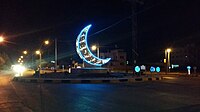
Ramadan is the ninth month of the Islamic calendar, observed by Muslims worldwide as a month of fasting (sawm), prayer (salah), reflection, and community. A commemoration of Muhammad's first revelation, the annual observance of Ramadan is regarded as one of the Five Pillars of Islam and lasts twenty-nine to thirty days, from one sighting of the crescent moon to the next.

Abu Tamim Ma'ad al-Mu'izz li-Din Allah was the fourth Fatimid caliph and the 14th Ismaili imam, reigning from 953 to 975. It was during his caliphate that the center of power of the Fatimid dynasty was moved from Ifriqiya to Egypt. The Fatimids founded the city of Cairo in 969 as the new capital of the Fatimid Caliphate in Egypt.

Abū al-ʻAbbās Ahmad ibn Muhammad at-Tijāniyy or Ahmed Tijani, was an Algerian Sharif who founded the Tijaniyyah tariqa.

Ezz El-Dine Ahmed Mourad Zulficar was an Egyptian film director, screenwriter, actor and producer known for his distinctive style, which blends romance and action. Zulficar is widely regarded one of the most influential filmmakers in Egyptian Cinema's golden age.
Mohamed Saad Abdel-Hamid Ibrahim is an Egyptian film actor and comedian, active since 1988. Saad known for comedic roles.

Hawawshi is a traditional Egyptian dish. It is a pita stuffed with minced meat and spiced with onions, pepper, parsley, and occasionally chilies. The major variants of hawawshi are "baladi" (standard) and Alexandrian. In most of Egypt, it is baked by filling the flat Egyptian bread with the meat mix and then baking it in the oven. In Alexandria, the ingredients are placed between two circular layers of dough, then baked in an oven. Alexandrian hawawshi also usually have different spices and seasonings. Hawawshi has spread to other countries in the Middle East and North Africa with some variation. In the Levant, it is made using saj bread and includes hot peppers in the filling. In Algeria, it is known as "muhajib" and is eaten with soup or a yoghurt salad.

Egyptian parliamentary elections to the House of Representatives were held in two phases, from 17 October to 2 December 2015. The elected parliament will be entrusted with the task of reviewing the laws that were passed while a parliament was not in session.

Mohamed Ramadan is an Egyptian Actor, Singer, Rapper, Dancer and Producer.
The 2017–18 Egyptian Premier League was the 59th season of the Egyptian Premier League, the top Egyptian professional league for association football clubs, since its establishment in 1948. The season started on 8 September 2017 and concluded on 20 May 2018. Fixtures for the 2017–18 season were announced on 30 August 2017.
The 2018–19 Egyptian Premier League, also known as The WE League for sponsorship purposes, was the 60th season of the Egyptian Premier League, the top Egyptian professional league for association football clubs, since its establishment in 1948. The season started on 31 July 2018 and concluded on 28 July 2019. Fixtures for the 2018–19 season were announced on 8 July 2018.

Mausoleum of Yacoub bin Abd al-Rahman is a mausoleum dedicated to Yacoub bin Abd al-Rahman, tabi'e, qāriʾ and hadith narrator. It is located at the side of Fouad Street in the city of Alexandria, Egypt. It is opposite the Mausoleum of Abdullah ibn Ali Zayn al-Abidin.

Rosaline Elbay is an Egyptian stage and screen actress, producer and writer. She is known for her roles as Judy Goodwin on the Netflix series Kaleidoscope, Amani on the Hulu/A24 Films series Ramy, and Sara on the MBC Masr series Qabeel.

Mohamed Ahmed RamadanIbrahim Ahmed known as Mohamed Ramadan is an international karate athlete from Egypt who is playing for Egypt national Karate team, Al-Ahly Sporting Club and Currently Playing for Al-Zohour Sporting Club and Spn Vernon French Club, He won several medals in international championships including World, Continental and Karate1.
Magnum Productions is an Egyptian media production company. Founded in 2017 by directors Ramy Imam and Hisham Tahseen, Magnum has produced several high-profile television series.
19 Ramadan is the nineteenth day of the ninth month (Ramadan) of the Islamic calendar.
Omer Ahmed Fadlallah Al-Fahal is a Sudanese writer, poet, and an expert in e-government systems and projects. He holds a Ph.D. degree in computer science, specializing in information system.

Ahmad Qandil was a Saudi Arabian poet and writer, emerged as a folk-popular poet who centralized Middle class culture in his Hejazi Arabic poetry and prose. Born in Jeddah, he studied and then taught at Al-Falah School, worked around one year as editor-in-chief of Sawt Al-Hijaz newspaper in Mecca, hold some positions in Ministry of Finance such as general manager of Hajj. After retirement from government occupations, he devoted himself to literary writing and media production in an institution he established, through which he cooperated with radio and television of Jeddah. He died at the age of 68 while recording the last episode of his program on Jeddah TV "Ramadan Lanterns", and left many collections of poetry some of which were published after his death.

El Safa Palace is a presidential palace in the Zizinia neighborhood of Alexandria, Egypt. It is located on a hill overlooking the Mediterranean.

El Tholathy El Mareh is a famous Musical band Egyptian, which appeared in the fifties of the twentieth century, and was distinguished by its social works that suited all levels regardless of their differences.

















